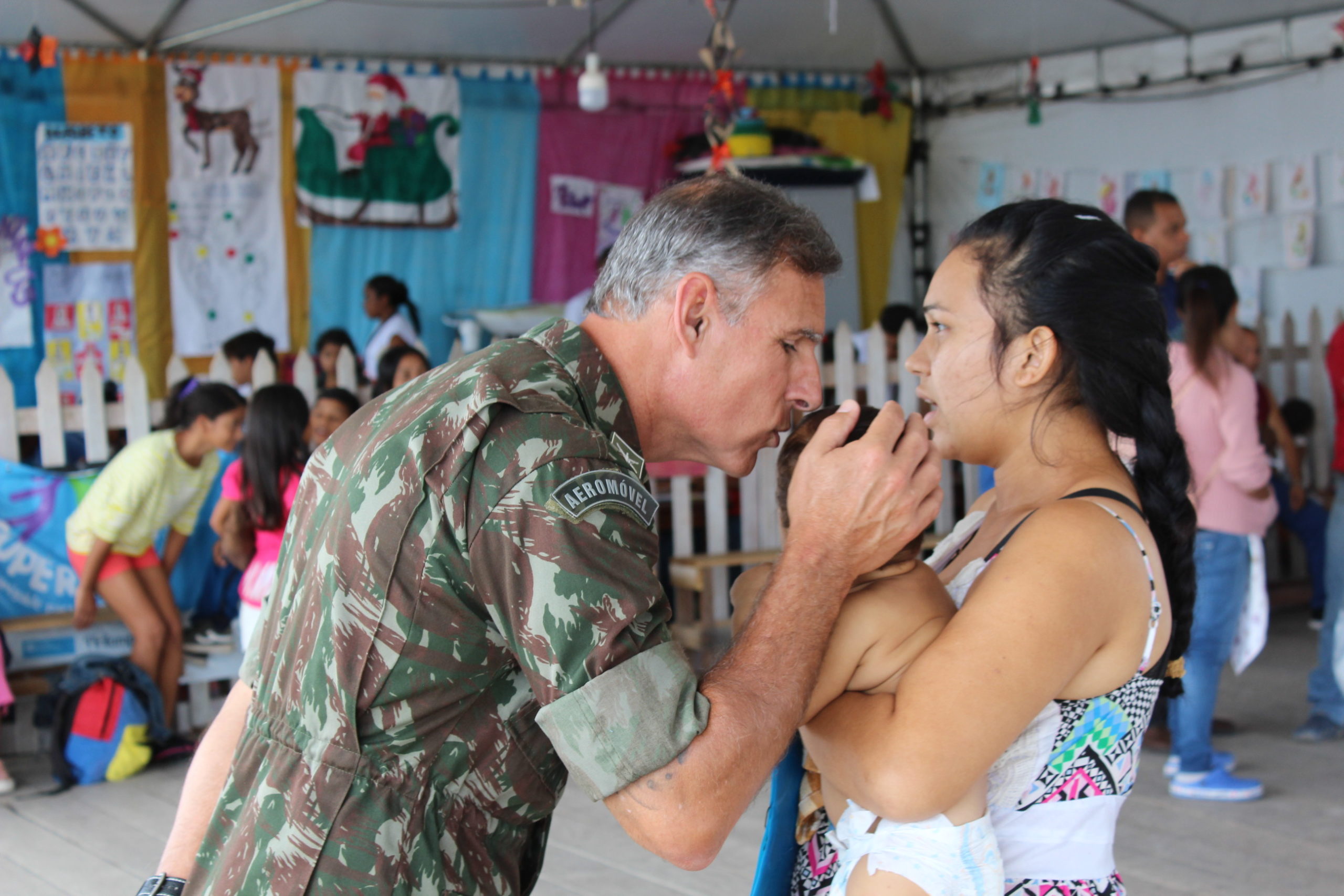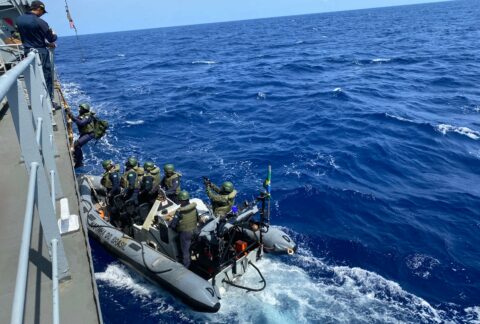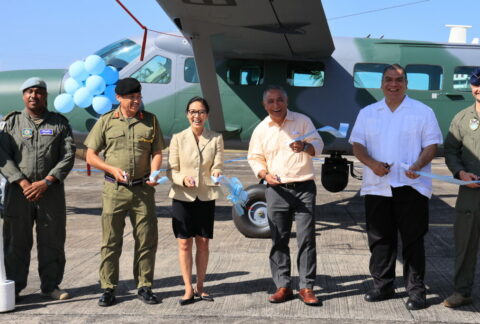The alarm goes off at 6 a.m. He wakes up and begins a typical military morning routine, with a good shave and a shower. Following a full breakfast, he starts what he sees as one the most gratifying part of the mission: giving smiles and hugs not only to his subordinates and Joint Staff, but to volunteers of nongovernmental organizations (NGOs) and various national and international agencies who work on the largest civil-military effort in the history of the Brazilian Armed Forces: Operation Shelter. “How many hugs a day? It’s hard to say, but there are many. This makes my job easier. The troops and others understand that I strive to show my love, to guide and care for each of them, individually and collectively. They trust me and I trust them,” said Brazilian Army Colonel Mauro Figueiredo Crespo, commander of the Pacaraima Military Base on the border with Venezuela.
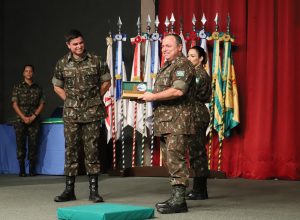
In January 2018, a humanitarian crisis emerged in Roraima (a state in Northern Brazil) due to the flow of Venezuelan immigrants. At the time, the city of Boa Vista, capital of Roraima, estimated that 45,000 Venezuelans, or 10 percent of the local population, had settled in the city. The country faced a new challenge: to provide shelter to the growing number of helpless Venezuelans (who, little by little, filled up the city’s streets) and give them hope for a better life.
Humanitarian Logistics Task Force
On February 28, 2018, the Brazilian government authorized the creation of Operation Shelter, under the leadership of the Secretary of the Interior and coordinated by the Ministry of Defense. The Armed Forces put together a task force to control the crisis. Then commander of the Brazilian Army (EB, in Portuguese) General Eduardo Dias da Costa Villas Bôas named Lieutenant General Eduardo Pazuello as coordinator of the Humanitarian Logistics Task Force for the state of Roraima (FT Log Hum, in Portuguese). “The Ministry of Defense identified the need — taking into account the Armed Forces’ rapid deployment of capabilities, modular logistics, and flexibility — to create a logistics branch for the operation, to execute this rapid deployment and, from that point forward, add the capabilities of humanitarian agencies that would later support us,” said Brazilian Army Colonel Carlos Frederico Cinelli, head of FT Log Hum’s Joint Chiefs of Staff.
FT Log Hum’s main mission is to coordinate and cooperate with the Brazilian Armed Forces (the Navy and Air Force also take part in this mission), government agencies, NGOs, international agencies, United Nations (U.N.) agencies, civil, religious, and philanthropic entities, to relocate vulnerable Venezuelan immigrants, enable their socio-economic integration, and maintain order in the border region between both countries. “The structure of the Humanitarian Logistics Task Force is similar to that of military warfare operations’ general staffs. We have functional cells, such as those that exists in the general staff of a military operation, with some additional structures, given the nature of the mission,” said Col. Cinelli.
Three pillars
Operation Shelter operates based on three pillars: border control, sheltering, and relocation. The first pillar organizes migration flow from the time migrants arrive at the border. Refugees are greeted and identified. Then, they are sent to migration control, managed by the Federal Police. Refugees must be vaccinated to be able to stay in the country. “Here at the Welcome and Identification Station [PRI, in Portuguese], we are Venezuelans’ first contact with Brazil. This is a customs service, assisting up to 1,500 people daily,” says EB Lieutenant Colonel Arcilio de Holanda Negreiros, PRI coordinator. “Our main task is to organize Venezuelans into groups, because some present complete documentation, while others have none. The majority are fleeing poverty in Venezuela, but some come as tourists or to visit relatives,” said Lt. Col. Negreiros.
The Venezuelans who wish to remain in Brazil are sent to representatives of the United Nations High Commissioner for Refugees (UNHCR). They then fill out a form to receive immigration documents (taxpayer identification number and a temporary work card). Refugees are also assessed for individual skills and professional knowledge.
Immunization as a requirement to stay
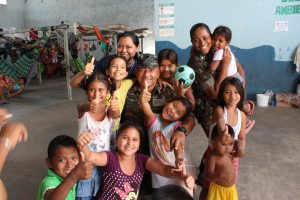
After the identification process, immigrants are vaccinated based on the World Health Organization’s recommendations for Brazil. Over 350,000 vaccines have been administered at the border to protect against the region’s main epidemics: MMR, yellow fever, and chickenpox. Only then comes the sheltering phase, which seeks to offer temporary housing to immigrants who need assistance in Brazil; and relocation, when refugees are sent to other Brazilian states to fill available jobs, reunite with family members, or go to shelters in Boa Vista or across Brazil.
“Currently, there are 13 shelters in Roraima, of those, 11 are in Boa Vista and two in Pacaraima. The shelters are organized to separately receive single men, single women, married couples with and without children, members of the LGBT [lesbians, gays, bisexuals, and transgenders] community, and indigenous population. The shelters provide three meals daily and offer services such as laundry and medical care, among others,” said EB Lieutenant Colonel Marcus Paulo Pessoa Pacheco, who heads the Rondon 3 shelter in Boa Vista’s southern zone, which can serve more than 1,100 people a day.
Aguirre Cabrero José Daniel, a 25-year-old Venezuelan who resides in temporary shelter BV8 in Pacaraima, said that Operation Shelter saved his life. “Being openly gay, I was persecuted in my city and suffered a lot of discrimination. Here in Brazil, people received me with open arms and smiles, even service members. I can’t complain. I feel very happy at this shelter.” Lesdy Josefina Abreu, 33, who also lives in BV8, shares Daniel’s opinion. “In Venezuela, I was afraid of people in uniform. They hit us; they abused people. The opposite happens here. They respect us for who we are, and they want to help. I am very grateful.”
In 2018, a daily average of 505 immigrants were recorded, a number that remained in place through 2019 and 2020. Since May 2018, more than 65,000 people received medical care in Boa Vista and 15,000 in Pacaraima. Many other services are also used to maintain the shelters, such well cleaning, waste collection, pest control, portable toilets, internet, TV, and satellite phone.
Relocation
The transfer of Venezuelans is coordinated among government representatives, the operation’s service members, U.N. representatives, and municipal representatives who wish to provide shelter to these immigrants. “Once vacancies are found, immigrants who are interested in participating in the relocation process are selected, must pass a health screening, have their documentation updated, and are then transferred to destination cities. Relocation is voluntary, details about the destination are provided ahead of time, and participants sign up to be volunteers for the International Organization for Migration [IOM],” said EB Colonel Francisco Augusto, who works at the Boa Vista relocation station.
Relocation started in April 2018, with 265 Venezuelans transferred to the cities of São Paulo (199) and Cuiabá (66). Since then, a little over 27,000 Venezuelan refugees were sent to 25 federative units in partnership with civil society — the process keeps improving. The objective is to reduce the impact of Venezuelan refugees and migrants’ arrival in Roraima, offering them new opportunities to integrate and join the workforce, restart their lives, and contribute to the growth of new host communities. Operation Shelter concludes when the relocation of immigrants is completed, that is when they are sent to other Brazilian municipalities and begin to have more socio-economic integration opportunities.
With no end in sight, Operation Shelter is considered the largest humanitarian mission in Brazil, with more than 3,000 service members deployed between 2018 and 2019. “I don’t know when this will all end, but I know we still have many smiles and hugs to give,” said Col. Mauro, in jest.
The private sector makes a difference
For this operation, the Brazilian Armed Forces have partnered with governmental agencies and NGOs, such as UNHCR, IOM, and the United Nations Children’s Fund, among others. The private sector also plays an important role with many small, medium, and large entrepreneurs coming together for this humanitarian cause.
One of the most active and beloved entrepreneurs in Boa Vista is Áurea Cruz, the owner of Pizzeria and Creperie Vila Takuara. She started to help Venezuelan immigrants four years ago, when a friend (a catholic priest) invited her to help distribute food to needy Venezuelans. “At first, the distribution was done three times a week. I would prepare and distribute an average of 40 meals a day. After a few weeks it exceeded 100 meals daily. Then 200, 300, and even 500 a day,” Áurea said.
Áurea and other volunteers from the same church were inspired to create a group they dubbed Stirring the Pot (Mexendo a Panela). “The rewards are priceless. I receive hugs, gratitude, and smiles from many children […]. I don’t make any money with Stirring the Pot, but we feed over 1,800 people daily.”

